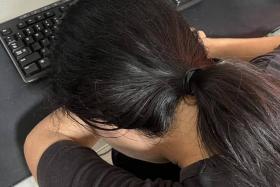Botox might relieve depression
Typically thought of as a cosmetic procedure, Botox may be effective at relieving depression
A Botox jab for your depression?
It sounds like a strange prescription, but that is what some patients have been receiving in the United States.
As early as 2014, psychiatrists Norman Rosenthal and Eric Finzi published a study showing that when people with major depression opted for Botox, about half of them reported a drop in symptoms six weeks later, compared with 15 per cent of the people given a placebo.
The remission of depressive symptoms has nothing to do with cosmetic improvement, as many patients without any lines do report fewer symptoms after Botox, Dr Finzi told The New Paper in an e-mail interview.
MOOD
Rather, it is because facial expressions are part of the circuit of the brain related to mood.
The assistant professor of psychiatry at The George Washington University School of Medicine in Washington said: "Specifically, the frown muscles, between the eyebrows, are involved in the emotions of sadness, anger and fear.
"Treatment of the frown muscles with botulinum toxin temporarily - about three months - prevents the face from expressing these emotions and feeds this information back to the limbic system of the brain that is involved with these emotions and depression.
"Botulinum toxin treatment of the frown has been shown to inhibit the amygdala, which is overactive in depression."
Building on Dr Finzi and Dr Rosenthal's 2014 study, Allergan - the maker of Botox - tried to replicate their findings on a larger scale with its own study.
Last month, Allergan moved the wrinkle-buster into late-stage clinical trials as a therapy for major depressive disorder (MDD) in women.
If proven effective, it will join the list of antidepressants to combat MDD, also known as clinical depression.
Botox is a neurotoxin derived from the bacterium Clostridium botulinum.
When ingested in contaminated food, it can interfere with key muscles in the body, causing paralysis and even death.
But when injected in tiny doses into targeted areas, it can cause muscles to relax by blocking signals between nerves and muscles.
Popular as an aesthetic treatment, Botox jabs smooth wrinkles by immobilising the muscles that surround fine lines.
The idea that depression may be treated by Botox adds to the dizzying range of conditions that doctors treat with Botox.
To date, the drug is approved for nine medical conditions and several cosmetic ones, though Allergan holds close to 800 more patents for potential uses of it.
Said Dr Finzi: "Given that about half of all patients fail standard treatments for depression, this would be a useful addition to the current medical treatments for depression.
"Botulinum toxin has been shown to help depressed patients who have failed standard therapies."
In Singapore, Botox is used to smooth wrinkles, steady a straying gaze, eliminate an eyelid spasm, prevent chronic migraines or stop signalling from nerves that stimulate sweat in a person's armpit, among its 10 medical uses approved by the Health Sciences Authority.
The practice of using it on depression has not caught on in Singapore, where MDD is the most common mental disorder.
The Singapore Mental Health Study in 2010 - the most recent study available - found that as many as one in 17 people suffer from MDD.
Dr Lim Boon Leng, a psychiatrist in private practice, told TNP: "I believe I can represent my psychiatrist colleagues in saying that we follow evidence-based practice, which means that any treatment must have good evidence that it works before we would recommend it to patients.
"At present, the use of Botox for depression lacks evidence of working."
Adding that he is not convinced by the available studies, he said: "There can be many biases in pharmacological studies conducted, and the studies must be carefully evaluated even if the investigators claim success."
But if Botox does indeed prove to be effective for relieving depression, it will be a welcome addition - a larger arsenal of treatments means more patients will receive the help they need, said Dr Lim.
"Patients who are treatment-resistant and not responding to any medications will have another shot at recovery," he added.
Get The New Paper on your phone with the free TNP app. Download from the Apple App Store or Google Play Store now



